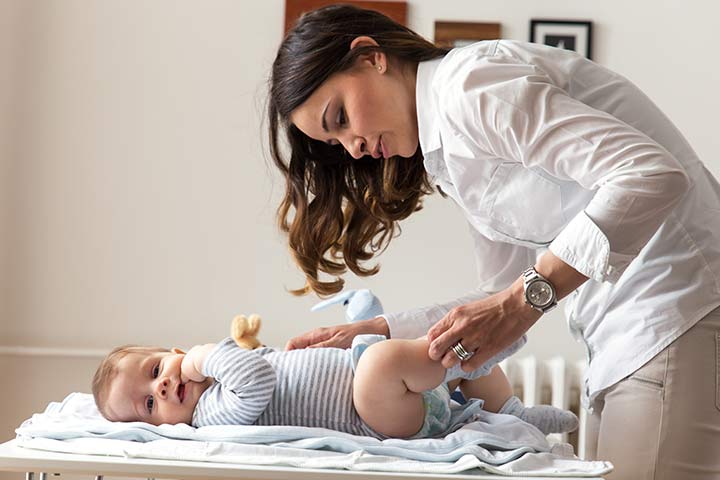
Image: Shutterstock
Do you find yourself worried about your little one’s bowel movements? Have you wondered how long is alright for a baby to go without pooping? A gap of a week or two in between two bowel movements of your infant can get you super worried. But, believe it or not, at times, it might not really be a cause of concern. And, he/she can make do with little or no medical care. If there are a million questions popping in your head now, don’t you worry. Here, we will elaborate on why it is alright if your little one doesn’t poop for a long time. And, we will also talk about when he/she may be constipated and might need treatment.
Bowel Movements Of A Breastfed Baby
You may have found your little one often going with no dirty diaper at all for several days. But, this does not always mean that he/she is suffering from constipation. Breastfed babies between the age of three to six weeks can do just alright with having only one bowel movement in a week. And, this is usually not something to worry about. Since breast milk usually does not produce much solid waste, the digestive systems of the infants don’t really have much to process and pass out (1).
Babies who are exclusively breastfed don’t usually suffer from constipation. So, even though they may go for a long time without pooping, it does not indicate that their tummy is brimming with poop. But, if the little ones still feel uncomfortable, there are chances that it may be because something else is wrong. And, another good thing is that breastmilk contains natural laxatives, so the infants are less likely to be constipated (2).
What About Babies Who Are Formula-Fed Or Eat Solid Foods?
The infants who are formula-fed or have already started consuming solid foods are more likely to suffer from constipation. So, if you find your baby being uncomfortable, struggling to have a proper bowel movement, or producing solid and hard stools, there are chances that he/she may be constipated. You can perhaps try massaging your little one’s belly, pamper him/her with a warm bath, or also note his/her rectal temperature. The rectal temperature will help you figure out whether he/she is also suffering from a fever, which in turn, will indicate if there is a more serious reason for the same.
Formula-fed babies should have at least one bowel movement in a day. So, along with this, if you also observe the other aforementioned symptoms, get to work (3). Be it constipation with or without fever, you should consult your doctor. There are infant suppositories available in the market, which your pediatrician may prescribe to you.
You may find yourself changing your newborn’s diaper around four to six times in the initial days (4). Even after the delivery, the baby’s intestines continue to mature. And, only as their digestive system becomes more mature, the duration between their bowel movements increase.
Why Do The Little Ones Suffer From Constipation?
The abdominal muscles of an infant are still strengthening with time. And, thus, pooping requires some effort. Since you have just gone through pregnancy, you may be able to relate to this bit. With the abdominal muscles being a little weak, it does become hard to have smooth bowel movements. So, in a way, your little one is also in a pretty similar predicament. They have to strain to poop, even if the poop is actually soft. But, this exercise may also help him/her in developing their muscles. However, with time, the muscles in the abdominal area will become strong, which will end up easing your baby’s bowel movement.
Of course, it is always important to consult a medical professional to have a better understanding, especially if this is worrying you too much. Don’t let yourself get too worked up though. You are amazing and you can always seek help if need be. Just keep doing your thing. Good luck!















